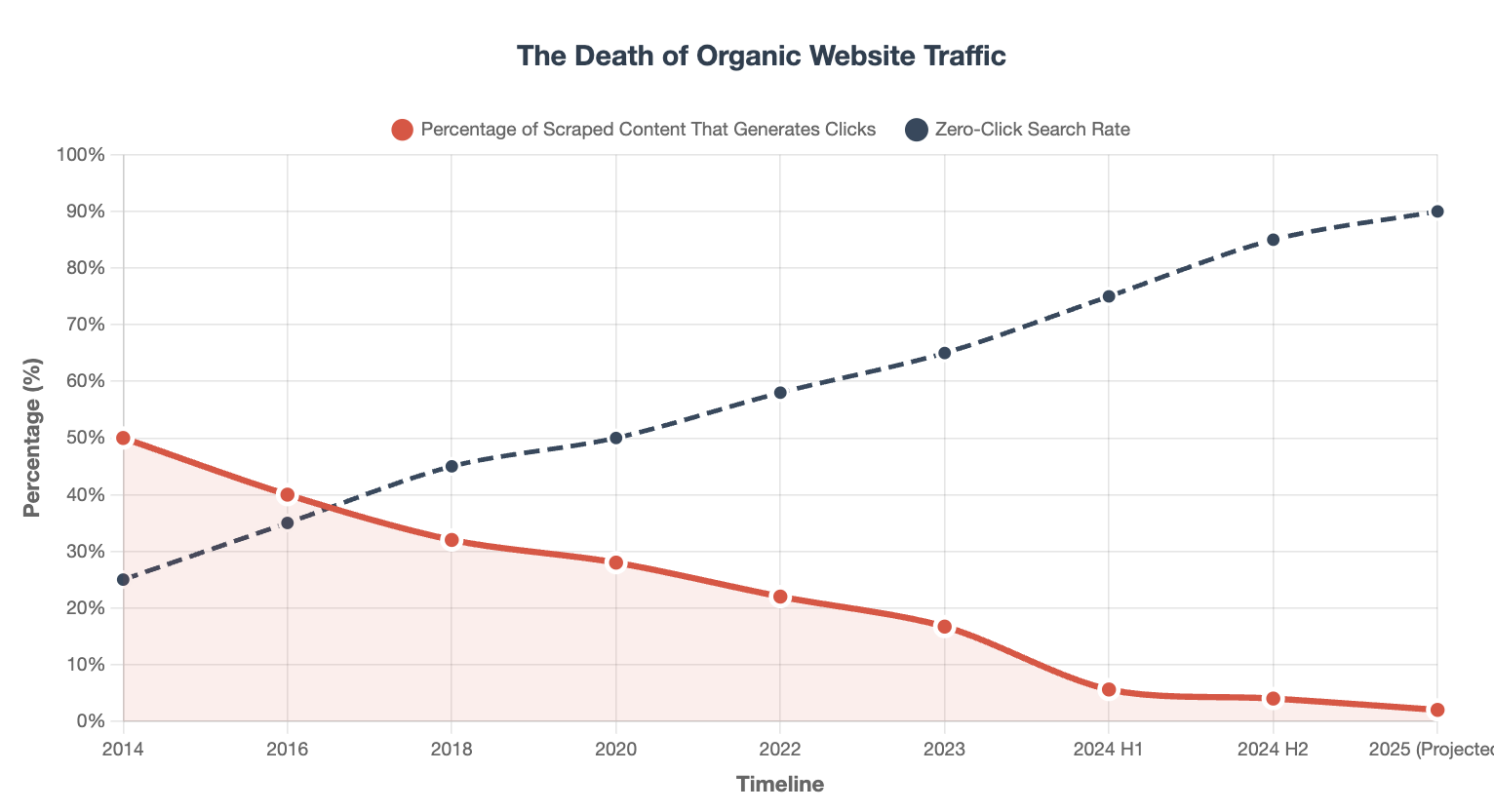AI is Choking Off Organic Traffic. Here’s What You Can Do.
When I posted to LinkedIn recently about the rise of AI and zero-click searches, I had no idea so many people in my network would comment and provide their own great insights. I decided to distill some of the comments below.
Strategic Shifts in Content Creation
Quality Over Quantity: Evan Bailyn noted that "Original, insightful content is still as important as ever, as long as it's on a transactional or timely subject. ChatGPT and the other chatbots can't create, they can only imitate." His agency is seeing continued success even with the rise of AI because they’ve "focused more on the strategic and creative tasks and less on the rote stuff that AI can automate."
Scott Luscombe reinforces this point, stating "if your content is just good you're dead. It has to be excellent now."
Funnel Focus Evolution: Evan Bailyn specifically confirms that "content clusters still help you rank for those lower funnel keywords. You just don't want to be doing definitional or other basic informational content."
Christy Puller observes that "Marketers who are still creating content based on top-of-funnel (TOFU) keywords are having a pretty bad existential crisis right now," while "Bottom of funnel is not being impacted heavily currently."
New Optimization Strategies
AI-First Approach: Elizabeth Moore reports that in her last role, "we replaced organic search rankings with AI overview inclusion as our SEMRush metrics Northstar, and restructured our primary use case pages to feature actually-valuable FAQs that matched specific queries so they'd rank well for AI Summaries."
However, Ema Davis points out the paradox: "The main recommendation seems to be to double down on clear, structured content with schema markup so AI can cite you more reliably. But ironically, that also makes it easier for AI to scrape and summarize your work, sometimes inaccurately."
Website as Data Source: Neil Ruffolo provides a very strategic insight: "We should no longer be viewing the primary role of the website as a destination, but rather as the source of data signals used by external systems. Think product specs, pricing, availability, applications / use cases, and verifiable performance info." He emphasizes that "A persuasion-based approach (i.e. storytelling and brand positioning) is not as important when a bot is shaping the short list."
Traffic and Attribution Challenges
Hidden AI Traffic: Logan Freedman reports seeing "a 400% increase in traffic over the past 6 months" but notes that "right now, the only way to track ChatGPT referrals is through referral traffic, and 90% of the time ChatGPT doesn't show a link, just the company name. That means a lot of this traffic shows up as branded search or direct."
Lauren Lang raises the attribution challenge: "GA doesn't reveal who is coming in via AI; that traffic is labeled as direct as AI tools don't provide referral info."
Differential Impact by Content Type: Jamie Stenton observes that "Clients who did drive traffic for information based searches have seen SEO traffic (for info) reduce by 30-80% in some cases. However, clients who are service based, are still seeing increasing traffic volumes."
Ian Brown notes that "Its disrupting top of funnel, education based funnels first" while "bottom of the funnel is still intact in organic."
Channel Diversification
Return to Paid Media: Scott Kozicki notes that "Most of the MarCom people I've spoken to lately are all leaning hard into sponsored content in more real time channels (podcasts, broadcast, YT, etc)" and warns this "begs the question about how media is all bought and paid for by big brands."
Old-School Tactics Revival: Milica Tepavac reports: "More and more, I use methods from old school marketing (before digital era): connections, events, niche groups, direct in person contact with customers."
Scott Dowling simply advises: "Go where the people are and get personal," though acknowledges these approaches are "difficult to scale."
Emerging Tools and Technologies
New Solutions: Adam Turinas mentions implementing webless.ai, explaining "We just ripped out the search bar on our website and replaced it with our own custom ChatGPT" to make content "more GEO-enabled so we come up in the GenAI tools responses."
Video and Real-Time Content: Jamie Stenton emphasizes that "video is key here, people don't necessarily want to read lots of content" and "real-time content is now of higher value than ever... and still will achieve AI citations, and SEO visibility."
Industry Perspective on Long-term Impact
Filtering Effect: Logan Freedman argues that "AI is actually helping by filtering out people who just want quick info and were never going to take action," suggesting that while traffic decreases, quality may improve.
Fundamental Business Strategy: Patrice Bilesimo provides a strategic perspective: "The rise of AI answer engines just exposes a deeper problem: too many teams still equate 'marketing' with the performance of collateral and campaigns." He argues for marketing to "sit upstream—shaping positioning, pricing, and roadmap" rather than just optimizing for traffic.
Future Monetization: CT Falk predicts that "At some stage there is going to be a paid to display within AI summaries once they are widely adopted," suggesting the current disruption may lead to new paid opportunities.
Quality Content Value: Tim Sprinkle suggests "There's a very real chance that this all raises the value of quality, unique content long-term, as differentiation becomes more difficult and traffic disappears."
The discussion definitely underscored strategies in transition. The successful practitioners seem to be adapting by focusing on content excellence, strategic positioning for AI systems, and diversifying beyond traditional SEO while maintaining quality standards that both AI and humans value.

